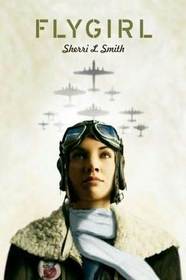Helpful Score: 1
Reviewed by Amber Gibson for TeensReadToo.com
World War II is raging across the globe and Ida Mae Jones is doing everything she can on the homefront to support the war effort. With her brother, Thomas, off fighting in the Pacific, Ida Mae wants nothing more than to see the boys come home safely.
Donating bacon grease and nylon stockings is not enough. Ida Mae cannot just sit at home when she knows that so many are dying overseas. When she sees an article in the newspaper announcing a new army initiative - WASP (Women Airforce Service Pilots) - she knows that she has found her calling. Like the Russians, Uncle Sam is finally letting women do more.
Flying has always been a passion for Ida Mae, since the first time her daddy took her up in his "Jenny," a Curtiss JN-4. She might not have a license, due to a sexist flight instructor, but Ida Mae is an experienced pilot. In fact, she feels more at home in the sky than on the ground. Her father flew to dust crops, and now Ida Mae wants to fly in the army.
There is just one problem. WASP is a program for white women, and Ida Mae is colored.
With her light skin and brown hair, she just might be able to pass for a white woman. To pursue her dream of becoming a WASP, Ida Mae must deny her identity and face unimaginable dangers. Graduating from the rigorous training in Sweetwater, Texas, to become a full-fledged WASP will be no easy task.
Can one colored girl prove to herself and the world that the sky really is the limit?
Sherri L. Smith smoothly incorporates extensive historical research to paint a bold and extraordinary portrait of the courageous women of the WASP. Like her idols, Jackie Cochran and Nancy Love, Ida Mae is a plucky, adventurous heroine, defying race and gender barriers to surpass even her own expectations. Smith is honest in portraying the often rough and unfair treatment that women of WASP endured, the unappreciated sacrifices that these women made all in the name of a country that did not see them as equals to men.
Ida Mae herself says it best - "We don't get any medals for the things we do. We don't get a parade when we go home." Even without the fanfare and celebrations that they deserved, the WASP played an essential role in winning World War II.
And for Ida Mae? "It's all the reward we need."
World War II is raging across the globe and Ida Mae Jones is doing everything she can on the homefront to support the war effort. With her brother, Thomas, off fighting in the Pacific, Ida Mae wants nothing more than to see the boys come home safely.
Donating bacon grease and nylon stockings is not enough. Ida Mae cannot just sit at home when she knows that so many are dying overseas. When she sees an article in the newspaper announcing a new army initiative - WASP (Women Airforce Service Pilots) - she knows that she has found her calling. Like the Russians, Uncle Sam is finally letting women do more.
Flying has always been a passion for Ida Mae, since the first time her daddy took her up in his "Jenny," a Curtiss JN-4. She might not have a license, due to a sexist flight instructor, but Ida Mae is an experienced pilot. In fact, she feels more at home in the sky than on the ground. Her father flew to dust crops, and now Ida Mae wants to fly in the army.
There is just one problem. WASP is a program for white women, and Ida Mae is colored.
With her light skin and brown hair, she just might be able to pass for a white woman. To pursue her dream of becoming a WASP, Ida Mae must deny her identity and face unimaginable dangers. Graduating from the rigorous training in Sweetwater, Texas, to become a full-fledged WASP will be no easy task.
Can one colored girl prove to herself and the world that the sky really is the limit?
Sherri L. Smith smoothly incorporates extensive historical research to paint a bold and extraordinary portrait of the courageous women of the WASP. Like her idols, Jackie Cochran and Nancy Love, Ida Mae is a plucky, adventurous heroine, defying race and gender barriers to surpass even her own expectations. Smith is honest in portraying the often rough and unfair treatment that women of WASP endured, the unappreciated sacrifices that these women made all in the name of a country that did not see them as equals to men.
Ida Mae herself says it best - "We don't get any medals for the things we do. We don't get a parade when we go home." Even without the fanfare and celebrations that they deserved, the WASP played an essential role in winning World War II.
And for Ida Mae? "It's all the reward we need."




